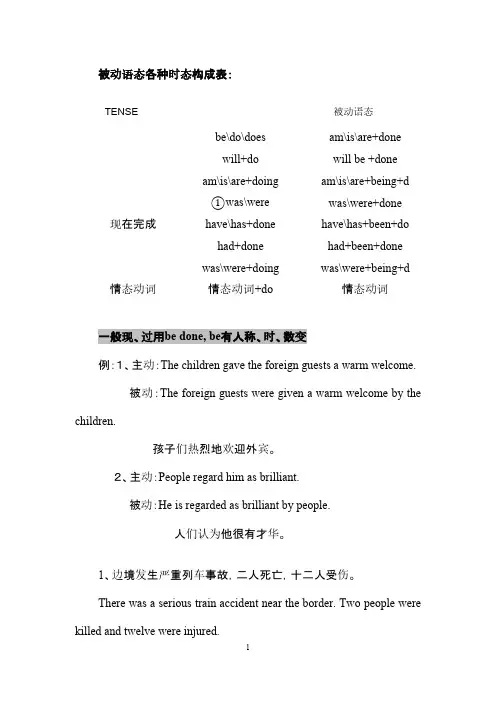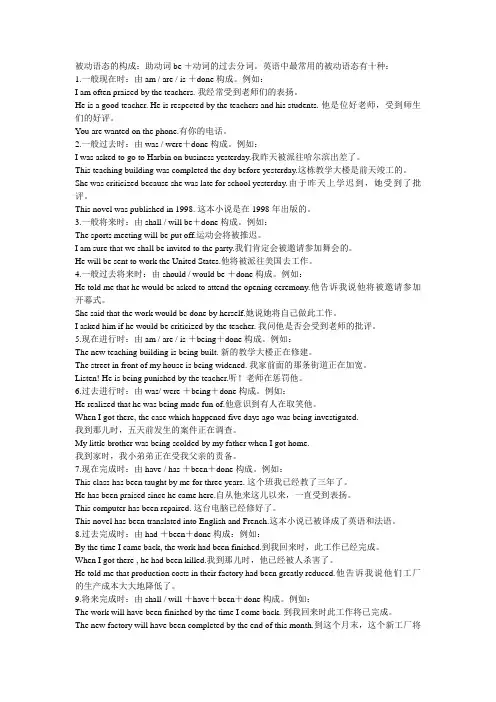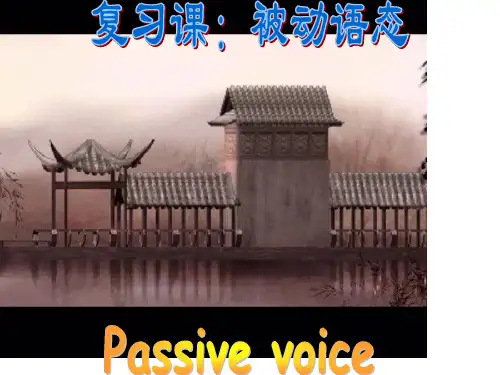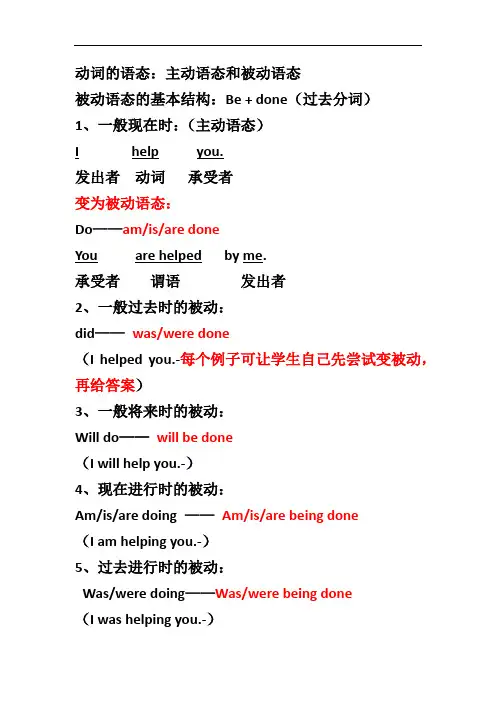被动语态各种时态构成表
- 格式:doc
- 大小:63.50 KB
- 文档页数:7

被动语态各种时态构成表:TENSE被动语态be\do\does am\is\are+donewill+do will be +doneam\is\are+doing am\is\are+being+d①was\were was\were+done现在完成have\has+done have\has+been+dohad+done had+been+donewas\were+doing was\were+being+d 情态动词情态动词+do情态动词一般现、过用be done, be有人称、时、数变例:1、主动:The children gave the foreign guests a warm welcome. 被动:The foreign guests were given a warm welcome by the children. 孩子们热烈地欢迎外宾。
2、主动:People regard him as brilliant. 被动:He is regarded as brilliant by people.人们认为他很有才华。
1、边境发生严重列车事故,二人死亡,十二人受伤。
There was a serious train accident near the border. Two people were killed and twelve were injured.2、直言不讳的人才是真正诚实的人。
A person who is truly honest is called a straight arrow.3、有人给讲演者递上来一张纸条。
A note was passed up to the speaker.4、John被选为班长而代替了亨利。
John was elected president of the class instead of Harry.5、这位战士牺牲了,然而列车得救了。

被动语态的构成:助动词be +动词的过去分词。
英语中最常用的被动语态有十种:1.一般现在时:由am / are / is +done构成。
例如:I am often praised by the teachers. 我经常受到老师们的表扬。
He is a good teacher. He is respected by the teachers and his students. 他是位好老师,受到师生们的好评。
You are wanted on the phone.有你的电话。
2.一般过去时:由was / were+done构成。
例如:I was asked to go to Harbin on business yesterday.我昨天被派往哈尔滨出差了。
This teaching building was completed the day before yesterday.这栋教学大楼是前天竣工的。
She was criticized because she was late for school yesterday.由于昨天上学迟到,她受到了批评。
This novel was published in 1998. 这本小说是在1998年出版的。
3.一般将来时:由shall / will be+done构成。
例如:The sports meeting will be put off.运动会将被推迟。
I am sure that we shall be invited to the party.我们肯定会被邀请参加舞会的。
He will be sent to work the United States.他将被派往美国去工作。
4.一般过去将来时:由should / would be +done构成。
例如:He told me that he would be asked to attend the opening ceremony.他告诉我说他将被邀请参加开幕式。





英语被动语态的构成形式**一、英语被动语态的构成形式**1. **构成形式**- 英语被动语态的基本结构是“be+过去分词”(be可以根据不同的时态、人称和数进行变化)。
- 例如:- 一般现在时:am/is/are + 过去分词。
- 一般过去时:was/were+过去分词。
- 一般将来时:will be+过去分词或者am/is/are going to be+过去分词。
- 现在进行时:am/is/are being+过去分词。
- 过去进行时:was/were being+过去分词。
- 现在完成时:have/has been+过去分词。
- 过去完成时:had been+过去分词。
- 情态动词(如can, may, must等):情态动词+be+过去分词。
2. **运用情况**- 当我们不知道动作的执行者是谁时。
例如:My bike was stolen yesterday.(我的自行车昨天被偷了。
在这里不知道是谁偷了自行车) - 当动作的执行者不重要或者不必要提及的时候。
例如:English is spoken all over the world.(全世界都讲英语。
重点是英语被讲这个事实,而不需要提及谁在讲)- 强调动作的承受者时。
例如:The bridge was built by theworkers last year.(这座桥是工人们去年建造的。
强调桥被建造这个动作,并且突出桥这个承受者)3. **10个例子及翻译**- 一般现在时:The book is written by a famous writer.(这本书是由一位著名作家写的。
)- 一般过去时:The window was broken by the naughty boy.(窗户被那个淘气的男孩打破了。
)- 一般将来时:A new school will be built here next year.(明年这里将建一所新学校。

各种时态的被动语态一、八大时态的被动语态的构成:1.一般现在时的被动语态构成:(am/is/are +done)如:I am asked to study hard. 我被请求努力学习。
This shirt is washed once a week. 这件T恤一周洗一次。
These songs are usually sung by boys. 这些歌曲通常是男生唱的。
2.一般过去时的被动语态构成:(was/were done)如:The soldier was killed, but the train was saved. 这位战士牺牲了,然而列车得救了。
Some notes were passed up to the speaker. 有人给讲演者递上来一些纸条。
3.一般将来时的被动语态构成:(shall/will be done)如:We shall be asked a lot of strange questions. 我们将被问许多怪题。
My son will be sent to school next September. 来年九月我将送我儿子去读书。
4.过去将来时的被动语态构成:(should/would be done)如:The news would be sent to him as soon as it arrived. 消息一到就会转给他的。
He told us that the new railway would be built the next year. 他告诉我新铁路将在明年修建。
5.现在完成时的被动语态构成:(has/have been done)如:The work has just been finished. 工作刚刚结束。
The old rules have been done away with by us. 旧规章已经被我们废除了。
6.过去完成时的被动语态构成:(had been done)如:By last December three ships had been built by them. 到去年十二月底他们已建造了三艘船。

被动语态各种时态构成表:TENSE 主动语态被动语态一般现在时be\do\does am\is\are+done一般将来时will+do will be +done现在进展时am\is\are+doing am\is\are+being+done一般过去时①was\were②did was\were+done现在完成时have\has+done have\has+been+done过去完成时had+done had+been+done过去进展时was\were+doing was\were+being+done情态动词情态动词+do 情态动词+be+done一般现、过用be done, be有人称、时、数变例:1、主动:The children gave the foreign guests a warm welcome.被动:The foreign guests were given a warm welcome by the children.孩子们热烈地欢送外宾。
2、主动:People regard him as brilliant.被动:He is regarded as brilliant by people.人们认为他很有才华。
1、边境发生严重列车事故,二人死亡,十二人受伤。
There was a serious train accident near the border. Two people were killed and twelve were injured.2、直言不讳的人才是真实的人。
A person who is truly honest is called a straight arrow.3、有人给讲演者递上来一纸条。
A note was passed up to the speaker.4、 John被选为班长而代替了亨利。
John was elected president of the class instead of Harry.5、这位战士牺牲了,然而列车得救了。

动词的语态:主动语态和被动语态被动语态的基本结构:Be + done(过去分词)1、一般现在时:(主动语态)I help you.发出者动词承受者变为被动语态:Do——am/is/are doneYou are helped by me.承受者谓语发出者2、一般过去时的被动:did——was/were done(I helped you.-每个例子可让学生自己先尝试变被动,再给答案)3、一般将来时的被动:Will do——will be done(I will help you.-)4、现在进行时的被动:Am/is/are doing ——Am/is/are being done(I am helping you.-)5、过去进行时的被动:Was/were doing——Was/were being done(I was helping you.-)6、现在完成时的被动:Have done——have been done (I have helped you.-)7、过去完成时的被动:Had done——had been done (I had helped you.-)8、过去将来时的被动:Would do ——would be done (I would help you.-)答案:2、You were helped by me.3、You will be helped by me.4、You are being helped by me.5、You were being helped by me.6、You have been helped by me.7、You had been helped by me.8、You would be helped by me.。

中考被动语态-基本时态篇目录引子一.定义二.结构和时态表一:以及物动词do为例,其各种时态的被动结构形式如下表所示:表二:带例句的被动语态表格表三:主动被动时态的对比表四:被动语态的句式变化:表五:含有情态动词的被动语态表六:非谓语动词的被动语态三.使用条件(用法)四. 两种语态互变五.总结与反思内容引子:汉语中对于被动语态的使用简直是小菜一碟,想必大家初次接触到“把”字句、“被”字句时大都不屑一顾。
很少有人主动把中文主被动的转换当作大碍。
但英文中因为动词时态的复杂,在转换成被动语态时自然容易搅得人头昏脑胀。
事实上我们经常用到的一些口语句型就是被动结构,如“Well done”、“The plane’s been delayed 10 minutes”等等。
如何对付被动语态,本文正是对症下药的良方一剂。
附名人名言A man is not finished when he is defended.He is finished when he quits.——Richard Nixon一.定义语态是动词的一种形式,用来说明句中主语和谓语动词的关系。
被动语态是动词的一种特殊形式.英语动词有两种语态:主动语态和被动语态.主动语态表示主语是动作的执行者,被动语态表示主语是动作的承受者. 即动作的对象,此时,主语是动作的逻辑宾语。
例如:1.My uncle repaired the TV set yesterday. 昨天我叔叔修理了那台电视机。
The TV set was repaired (by my uncle) yesterday. 那台电视机昨天被(我叔叔)修理了。
2.Many people speak English.(主动语态)English is spoken by many people.(被动语态)汉语往往用"被"、"受"、"给"等词来表示被动意义。
被动语态各种时态构成表:TENSE 主动语态被动语态一般现在时be\do\does am\is\are+done一般将来时will+do will be +done现在进行时am\is\are+doing am\is\are+being+done一般过去时①was\were ②did was\were+done现在完成时have\has+done have\has+been+done过去完成时had+done had+been+done过去进行时was\were+doing was\were+being+done情态动词情态动词+do 情态动词+be+done一般现、过用be done, be有人称、时、数变例:1、主动:The children gave the foreign guests a warm welcome.被动:The foreign guests were given a warm welcome by the children.孩子们热烈地欢迎外宾。
2、主动:People regard him as brilliant.被动:He is regarded as brilliant by people.人们认为他很有才华。
1、边境发生严重列车事故,二人死亡,十二人受伤。
There was a serious train accident near the border. Two people were killed and twelve were injured.2、直言不讳的人才是真正诚实的人。
A person who is truly honest is called a straight arrow.3、有人给讲演者递上来一张纸条。
A note was passed up to the speaker.4、John被选为班长而代替了亨利。
John was elected president of the class instead of Harry.5、这位战士牺牲了,然而列车得救了。
The soldier was killed, but the train was saved.6、他被认为很聪明但不诚实。
He was thought to be clever but dishonest.7、美国的第一个动物园是1874年建立的。
The first zoological garden in the United States was established in 1874.8、多数环境污染问题的存在,是因为过去没有采取适当的保护措施。
Most environmental problems exist because adequate measures for preventing them were not taken in the past.完成时态have/had done,被动将been加中间。
例:1、我们已经在夜校里断断续续地学了三年英语了。
主动:We have studied English for 3 years off and on at the spare-time school.被动:English has been studied for 3 years off and on at the spare-time school.(have随新主语变为has)2、到去年年底我们已生产出一百台拖拉机。
主动: They had produced 100 tractors by the end of last year.被动: 100 tractors had been produced by the end of last year.3、到去年年底他们已建造了三艘船。
主动:They had build three ships by last December.被动:By last December three ships had been built by them.4、人们把装满垃圾的塑料袋子堆放在街上。
主动:People have piled plastic bags full of rubbish in streets.被动: Plastic bags full of rubbish have been piled in streets.5、他们已提醒我们要注意老鼠。
主动:They have warned us to be careful of rats.被动:We have been warned to be careful of rats.练习:1、今天是Judy的新婚日,她刚刚和鲍勃结婚。
Today is Judy's wedding, she has just been married to Danel.2、演讲委员会已宣布了这些讲演的题目。
The subjects of these lectures have been announced by the lecture committee.3、当我回来时,发现我的车被弄走了。
我问他们为啥这么于。
他们告诉我说因为我把车于停在"禁止停车"的禁区。
My car had been towed away when I came back.一般将来shall (will) do,被动变do为be done即由shall do或will do变为shall done或will be done。
例:1、过年我市将建立几座大型现代化的发电厂。
主动: We shall build several big modern power plants in our city next year.被动:Several big modern power plants will be built in our city next year.(shall do中的shall要随新主语变为will, do为be done.)2、过年九月我将送我次子去读书。
王动:I shall send my second boy to school next September.被动:My second boy will be sent to school next September.3、他们将问你许多怪题。
主动:They will ask you a lot of strange questions.被动: You will be asked a lot of strange questions.被动句中的by引出的宾语,一般说来,如果是人称代词你、我、他等,均可省略,someone no one不由by来引出。
如果是名词不能省略,但当今英语也都可省略了。
1、中国人民在将来将进行更多的空间探索。
主动:The Chinese people will make more space explorations in the future.被动:More space explorations will be made in the future by the Chinese people.2、通常是昼夜供电,明天白天将停电。
Usually, the electricity is on for 24 hours. But tomorrow it will be cut off in the day time.3、电池使用一段时间后,应该更换。
After a period of use, the batteries should be changed.4、这机器不能再用了。
The machine will not be used again。
将来进行无被动:shall(will)be doing现在完成进行同:have(has)been doing即将来进行时表示动作在将来某一时刻或某个阶段正在进行;现在完成进行时表示某一行为发生在过去,延续到现在,将续续下去,两种时态不能用被动语态。
1、今晚你将做什么?(将来进行时)What will you be doing this evening?2、1980年以来,我一直住在鞍山。
(现在完成进行时)I have been living in Anshan Since 1980.3、你学英语多久了?(现在完成进行时)How long have you been studying English?4、由于大雾,我们已经在机场等了一整天了。
(现在完成进行时)We have been waiting at the airport all day because of the thick fog.【现、过进行be doing,被动be加being done】即现在进行时或过去进行时都是be的人称、时和数的形式加doing。
而被动态则是be加上being done的形式,being是不变的。
现在进行时和过去进行时的被动态是被动态个的重点,容易搞错。
例如:1、工人们正在维修东北工学院主楼。
主动:The workers are repairing the main building of the Northeast Engineering Institute.被动:The main building of the Northeast Engineering Institute is being repaired by the workers.2、委员会的委员们正在考虑那个棘手的问题.The nasty question is being considered by the committee members.3、他们在计划修建另一座跨线桥。
The building of another fly-over is being planned.【情、助、有、是妥安排,一律随新主语变。
】带情态动词和助动词等的被动态如何处理比较复杂。
要随新的主语来变化,这些词如can, could;will, would; shall, should; may, might; must; ought to; need需要;have to不得不;be going to; to be to; used to; seem to; happen to等。
例如:1、我们必须把这个记在心里。
主动: We must keep this in mind.被动:This must be kept in mind.2、我们可以把电冰箱放在那个地方。
主动:We can put the refrigerator in that place. (refrigerator=freezer.)被动:The refrigerator can be put in that place.3、我们不能再用那台洗衣机了。